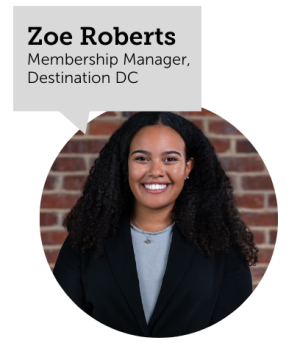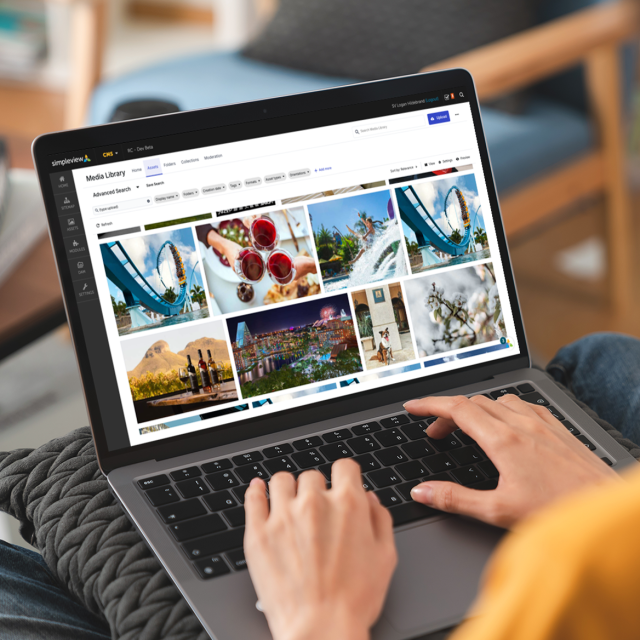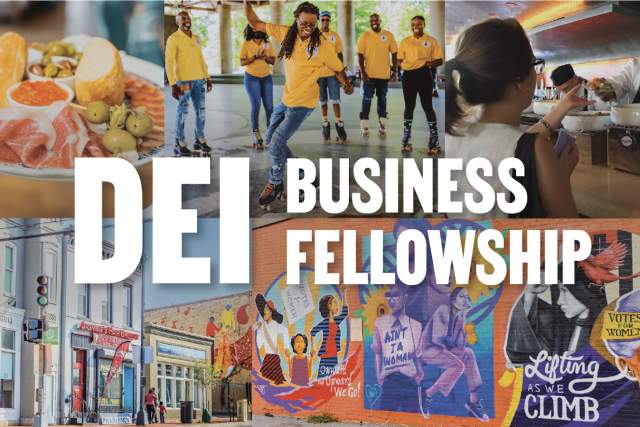August is National Black Business Month — a time when individuals and businesses recognize Black-owned businesses across the country and highlight their contributions to the local economy. Destination DC (DDC) launched the DEI Business Fellowship (DEIBF) as a purposeful effort to support small businesses in the local travel and tourism industry owned by people of color, LGBTQ+ persons, women, persons with disabilities, and their allies. Now in the third year of the program, the DEIBF supports 45 minority business owners through complimentary marketing, mentorship, education, and networking opportunities.
Zoe Roberts, Membership Manager at Destination DC, shares how the organization helps sustain and grow the city’s diversity of businesses through economic development initiatives. We hope this Q&A provides inspiration for how destination marketing organizations (DMOs) can effectively create community partnerships and support minority-owned businesses and entrepreneurs year-round.

Q: How diverse is your destination’s local economy?
According to the DC Department of Small and Local Business Development, black-owned businesses comprise around 28% of the District's businesses, giving it the highest percentage of Black-owned businesses in the country. As we looked at the tourism industry, specifically coming out of the COVID-19 pandemic, we recognized the need to recover equitably. Through content on the DEI District and the DEIBF program, we have supported local small businesses through promotion and economic impact.
Q: What special initiatives does your DMO have in place to promote Black-owned businesses year-round?
At DDC we purposefully include DC’s Black-owned businesses in all marketing and communications channels, spanning advertising, content, earned and paid social, and editorial.
Our DEI District content hub was created to showcase Washington, DC, as a global destination while promoting and validating diversity, equity, and inclusion (DEI). The hub is designed to redirect visitors to the resources they seek through four pillars:
-
Visit: Highlighting inclusivity in our attractions
-
Learn: Resources to empower students and youth
-
Meet: Resources for meeting planners
-
Engage: Ways to support our technical training program and workforce development initiatives through the American Experience Foundation (AEF)
The “Engage” pillar relates directly to our DEIBF program, which aims to connect small businesses with the lucrative meetings market and ensure our customers can access suppliers from diverse backgrounds.
Q: How is your DMO recognizing Black Business Month?
DDC aligns closely with our mayor’s initiatives and eight-step “Comeback Plan” that emphasizes equity — which means we work to highlight black businesses year-round. Washington.org has the top search engine result for the key phrase, “black businesses DC.” We benefit local businesses and readers by linking the destination to Black Businesses year-round. DDC has lots of evergreen content that cross-promotes Black Business Month and has lots of domain authority. We have highlighted Black History Month and Black Restaurant Week and will reference Black Business Month in timely roundups on popular pages while playing up our existing Black-owned business content and social engagement throughout the month.
Q: How does your DMO collaborate with local, Black-owned businesses?
A significant way we collaborate with local Black-owned businesses is through our DEIBF program. This program launched in Fall 2021 to build capacity in historically underrepresented and under-resourced businesses within our industry. Each year, a cohort of businesses is selected and receives a free DDC membership, technical training in sales and marketing, and workforce development support. Through strategic prospecting and intentional engagement, this program's reach has transcended traditional tourism areas, fostering socioeconomic equity and inclusivity. We have 45 businesses in this year's cohort from various backgrounds and business categories. Examples of engagement through this program include:
-
Sponsoring registration for business fellows to the Washington DC Economic Partnership (WDCEP) annual luncheon, where they bring together over 700 stakeholders to highlight the development accomplishments of our city.
-
Among the 34 cohort members in CY2023, DDC generated 350+ business referrals to clients, and eight exclusive events shared with DDC members.
-
Shared city grant opportunities to business fellows in their monthly calendars. In CY2023, we had two business fellows apply for grants and win.
Q: Describe how your DMO empowers Black entrepreneurship by offering mentorship and training programs.
Based on the first year of programming, we identified ways to expand the program's reach by adjusting our approach to its content. We identified ways to expand the programs' reach by adjusting our approach to content and hosting tailored educational sessions. These sessions are designed to familiarize them with the travel and tourism industry and give actionable steps to become more engaged. Integrating city programming and including grant opportunities, awards, and certifications was also influential in increasing awareness for these businesses. So far this year, we have had three of five exclusive webinar sessions for the business fellows. These webinars cover topics ranging from social media management and communications to best practices while responding to request for proposals (RFPs) from meeting planners.
We also partner with our affiliated charity, the AEF, to support workforce development. AEF works with hospitality, culinary arts, and mass media high school students and places interns (at no expense to the host employer) with small businesses that need support building their workforce pipeline.
Q: What advice do you have for DMOs striving to create more inclusive, welcoming, and diverse destinations for visitors and locals alike?
Just start! Through the DEIBF program, we've created a scalable initiative that builds capacities in small businesses within our industry. Thus far, it has yet to be funded outside of our membership budget. It requires working hours from multiple teams but only needs a few resources to be impactful.
Through strategic prospecting and intentional engagement, this program's reach has transcended traditional tourist areas, fostering socio-economic equity and inclusivity within our destination. Even better, its framework has created opportunities to replicate other initiatives within our organization.
Diversity in the spotlight.
Watch our “Shining a Spotlight on Black-Owned Businesses in Your Community” webinar.
Tune in


